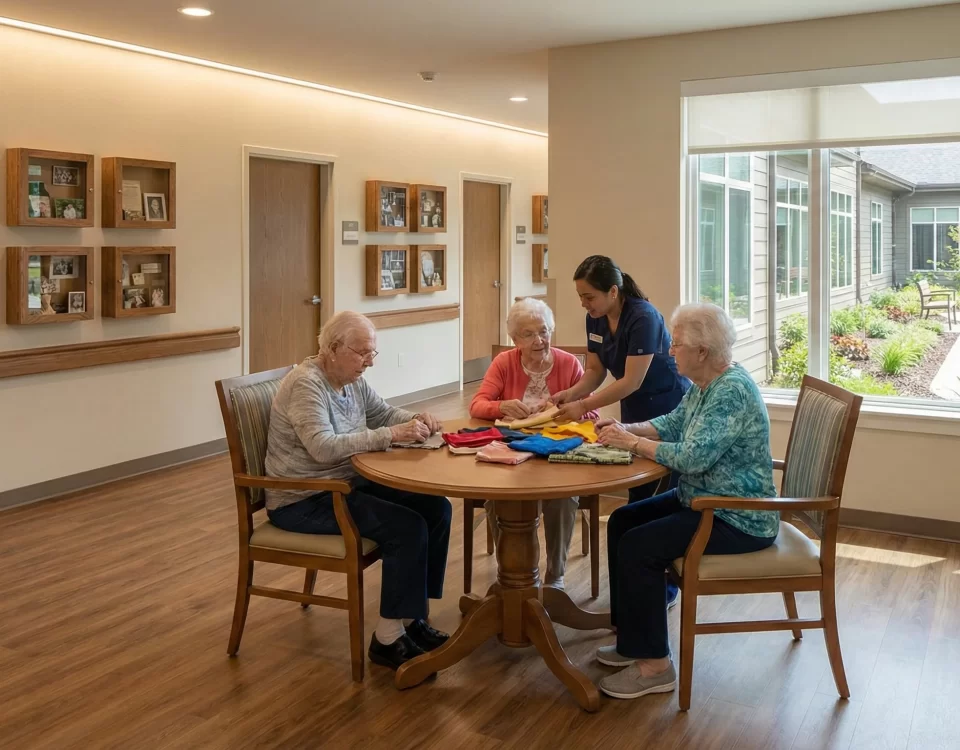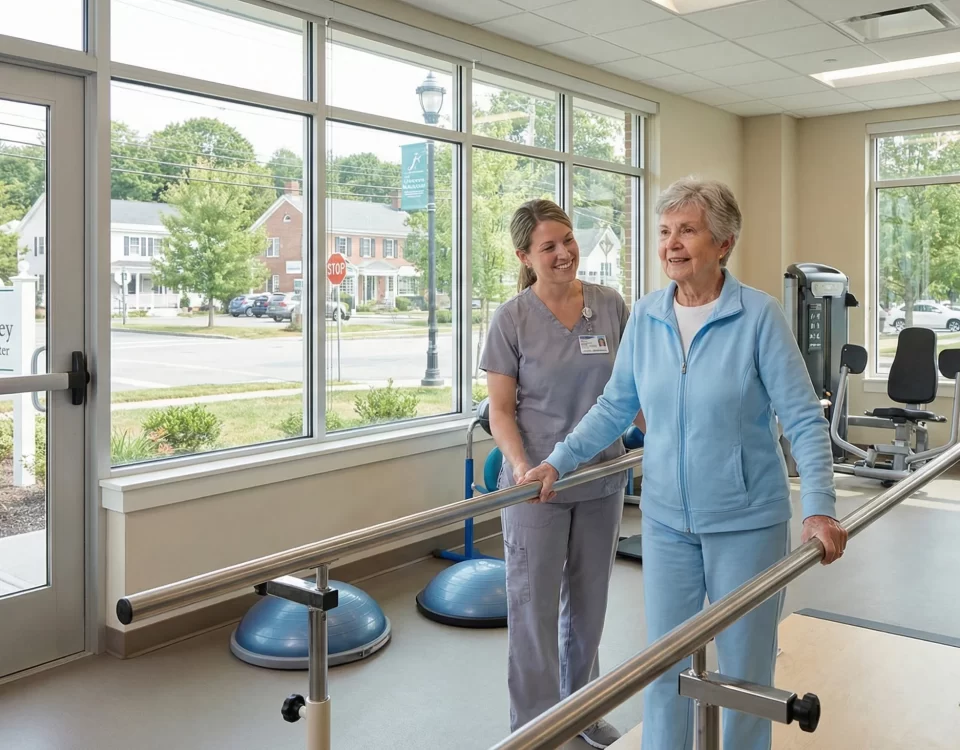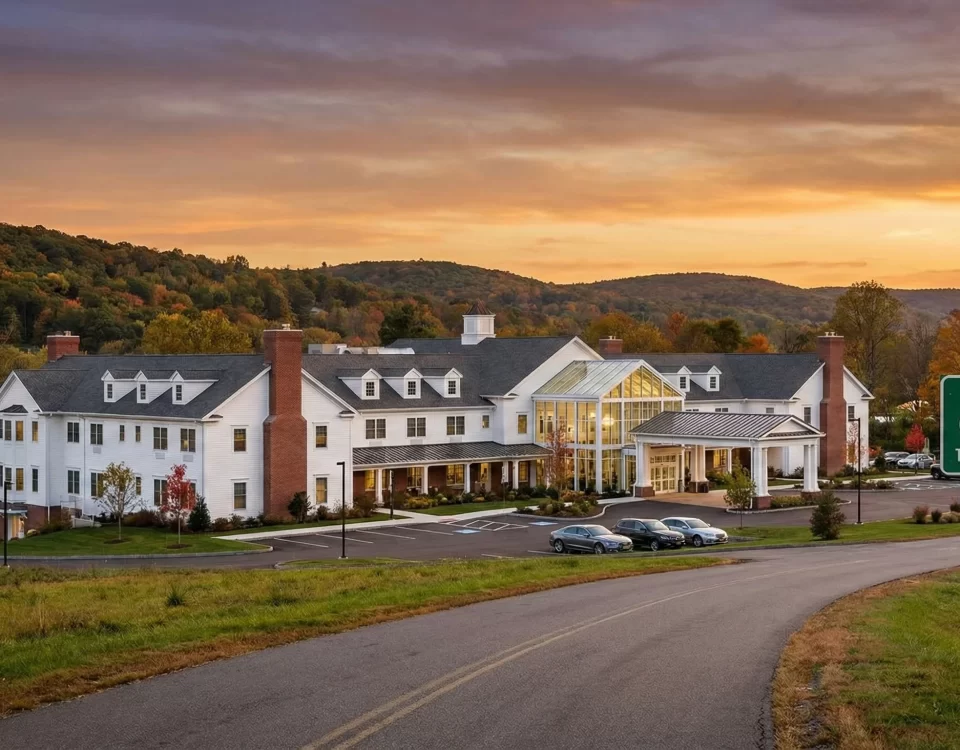Rehabilitation Centers Near Me: Why New Milford, CT Is the Best Choice for Recovery
November 10, 2025
Why New York Families Choose Connecticut Skilled Nursing in 2026
January 1, 2026Rehab in New Milford, CT: A Guide to Senior Wellness
As we or our loved ones age, the path to recovery after surgery, illness, or an injury can seem daunting. For seniors living in and around New Milford, CT, understanding the available support systems is crucial for a successful and speedy recovery. This is where specialized rehab facilities play a pivotal role. These centers are more than just places for physical therapy; they are dedicated environments designed to help seniors regain strength, restore independence, and enhance their overall quality of life.
This guide will explore the world of senior rehabilitation in New Milford, CT. We’ll look at what senior rehab entails, the different types of facilities available, and the key benefits they offer. By understanding these options, seniors and their families can make informed decisions, paving the way for a smoother journey back to health and wellness. Whether it’s intensive post-surgery recovery or ongoing therapy to manage a chronic condition, the right rehab facility can make all the difference.
Understanding Senior Rehab
Senior rehab is a specialized branch of healthcare focused on restoring function and improving the quality of life for older adults. Unlike general rehabilitation, which may cater to a broad age range, senior rehab addresses the unique physiological, cognitive, and emotional needs of the elderly. The aging process brings changes to the body, such as decreased muscle mass, reduced bone density, and slower healing times, which require a tailored therapeutic approach.
The primary goal of rehabilitation for seniors is to help them regain as much independence as possible. This involves personalized care plans that target specific challenges and work toward achievable goals, from walking unassisted to performing daily activities like dressing and cooking.
Common Reasons for Senior Rehab
Seniors may require rehabilitation for various reasons. The most common scenarios include:
- Post-Surgery Recovery: After procedures like hip or knee replacements, heart surgery, or spinal operations, rehabilitation is essential. It helps manage post-operative pain, rebuild strength and mobility, and ensure a safe transition back to daily life.
- Recovery from Illness: Serious illnesses such as a stroke, heart attack, pneumonia, or a severe infection can significantly weaken the body. Senior rehab provides the structured therapy needed to recover physical and cognitive function.
- Injury Rehabilitation: Falls are a major cause of injury among seniors, often resulting in fractures or head injuries. A dedicated rehab program helps individuals heal correctly, regain confidence, and learn strategies to prevent future falls.
- Management of Chronic Conditions: Diseases like arthritis, osteoporosis, Parkinson’s disease, and multiple sclerosis can impact mobility and function. Rehabilitation helps manage symptoms, slow disease progression, and maintain independence for as long as possible.
- Decline in Function: Sometimes, a gradual decline in physical or cognitive ability necessitates intervention. Senior rehab can help identify the underlying causes and create a plan to improve strength, balance, and overall function.
Types of Rehab Facilities in New Milford
When searching for “rehab facilities near me,” you’ll find several types of centers, each offering a different level of care. Understanding these distinctions is key to choosing the right environment for your or your loved one’s needs.
Inpatient Rehab Facilities
Inpatient rehab facilities, sometimes known as a rehabilitation hospital, provide the most intensive level of care. Patients stay at the facility 24/7 and receive comprehensive medical supervision and a rigorous therapy schedule, typically including at least three hours of therapy per day, five to six days a week.
- Who it’s for: This setting is ideal for seniors who have complex medical needs following a significant event like a stroke, major surgery, or severe injury. They require constant medical monitoring and intensive, multidisciplinary therapy to make a meaningful recovery.
- Services: Services include round-the-clock nursing care, regular physician oversight, physical therapy, occupational therapy, and speech therapy.
Outpatient Rehab Facilities
Outpatient rehabilitation centers near me offer more flexibility. Seniors live at home and travel to the facility for scheduled therapy sessions, which can range from a few times a week to daily visits.
- Who it’s for: This option is suitable for seniors who are medically stable and have a supportive home environment. They are independent enough to manage their daily lives but still need consistent therapy to continue their recovery. It’s often a step down from inpatient care.
- Services: Outpatient clinics provide physical, occupational, and speech therapy sessions. The focus is on continuing to build strength, mobility, and functional skills.
Skilled Nursing Facilities (SNFs)
Skilled nursing facilities offer a blend of medical care and rehabilitation services. They provide short-term rehab for patients transitioning from a hospital stay, as well as long-term care for those who need ongoing medical support.
- Who it’s for: SNFs are a good fit for seniors who may not be able to tolerate the intensity of an inpatient rehab hospital but still require significant medical care and daily therapy. They are a common choice for post-surgery recovery, especially after joint replacements.
- Services: SNFs provide 24-hour nursing care, assistance with daily activities, and rehabilitation therapies. The therapy programs are generally less intensive than those in an inpatient facility.
Key Features of Effective Rehab Centers
Not all rehab centers are created equal. When evaluating options for senior rehab in New Milford, look for facilities that demonstrate a commitment to high-quality, patient-centered care.
- Personalized Treatment Plans: The best facilities create individualized care plans. Upon admission, a multidisciplinary team should conduct a thorough assessment to understand the patient’s medical history, functional abilities, and personal recovery goals. The treatment plan should be a living document, adjusted as the patient progresses.
- Experienced Medical Staff: A qualified and compassionate team is the backbone of any great rehab facility. This includes board-certified physicians, registered nurses, and licensed physical, occupational, and speech therapists who specialize in geriatric care.
- State-of-the-Art Equipment: Effective rehabilitation often requires modern equipment. Look for facilities with well-equipped therapy gyms that feature tools for strength training, balance exercises, and functional mobility practice.
- Comfortable and Safe Environment: The physical environment plays a significant role in recovery. A clean, safe, and welcoming atmosphere helps seniors feel comfortable and motivated. This includes accessible rooms, nutritious meals, and opportunities for social engagement.
The Benefits of Rehabilitation for Seniors
Participating in a structured rehab program offers numerous benefits that contribute to a senior’s overall well-being.
- Improved Physical Function: Through targeted exercises, physical therapy helps seniors regain strength, improve balance and coordination, and increase mobility. This is fundamental to preventing falls and restoring independence.
- Enhanced Cognitive Abilities: For seniors recovering from a stroke or those with cognitive decline, speech and occupational therapists can provide cognitive therapy. These exercises help improve memory, problem-solving skills, and attention.
- Effective Pain Management: Chronic pain can be debilitating. Rehab facilities use a variety of techniques, including therapeutic exercises, heat/cold therapy, and manual therapy, to manage pain without relying solely on medication.
- Increased Independence: The ultimate goal of senior rehab is to help individuals return to their daily lives with confidence. Occupational therapists work with patients on activities of daily living (ADLs), such as bathing, dressing, and preparing meals, ensuring they can perform these tasks safely on their own.
Choosing the Right Rehab Facility in New Milford, CT
Making the decision about where to go for rehab can feel overwhelming. Here are practical steps to help you choose the best facility for your needs.
- Check Location: Proximity is important. A facility that is convenient for family and friends to visit can provide crucial emotional support during the recovery process.
- Verify Accreditation and Licensing: Ensure the facility is licensed by the state of Connecticut and accredited by a recognized organization like The Joint Commission or CARF International. This indicates that the facility meets rigorous standards for quality and safety.
- Review Services Offered: Does the facility specialize in the type of care you need? For example, if you’re recovering from a stroke, look for a center with a strong neurology and speech therapy program.
- Read Reviews and Testimonials: Search online for reviews from previous patients and their families. While individual experiences vary, patterns in feedback can offer valuable insights.
- Tour the Facility: If possible, visit the facilities you are considering. Pay attention to the cleanliness, the attitude of the staff, and how patients are treated. Does the therapy gym look active and well-maintained?
- Understand Cost and Insurance: Before committing, clarify all costs and confirm what your insurance will cover. The facility’s admissions office should be able to help you navigate your Medicare, Medicaid, or private insurance benefits.
Rehab Centers in New Milford, CT
New Milford and the surrounding Litchfield County area are home to several reputable facilities offering senior rehab. While it’s important to do your own research, here are a few local options often considered by residents:
- Local Skilled Nursing Facilities: Many skilled nursing centers in and around New Milford offer excellent short-term rehabilitation programs. These facilities are often a preferred choice for post-surgery recovery, providing a seamless transition from hospital to home with dedicated therapy wings and experienced staff.
- Regional Rehabilitation Hospitals: For more intensive needs, larger rehabilitation hospitals in nearby cities offer specialized programs for complex conditions like spinal cord injuries, traumatic brain injuries, and strokes.
When looking for “rehabilitation centers near me,” start by consulting with your hospital’s discharge planner or your physician. They can provide recommendations based on your specific medical needs and insurance coverage.
The Role of Family and Community
A successful recovery journey is rarely completed alone. The support of family and community is invaluable. Family members can provide emotional encouragement, participate in therapy sessions to learn how to assist at home, and act as advocates for their loved ones.
Furthermore, community resources in New Milford, such as senior centers and local support groups, can provide ongoing opportunities for wellness and social engagement after formal rehabilitation ends. Staying active and connected is key to long-term health.
Chart Your Path to Recovery
Choosing a rehab facility is a significant step on the road to recovery. For seniors in New Milford, CT, there are excellent options available to support healing and restore vitality. By understanding the different types of care, evaluating facilities based on key quality indicators, and actively participating in the recovery process, seniors can achieve the best possible outcomes. Take the time to research, ask questions, and select a facility that aligns with your personal needs and goals. Your journey back to wellness is worth the effort.



